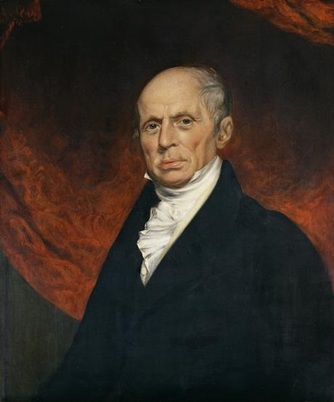Big Ben, 5 pm by martin_vmorris, licensed under Creative Commons 2.0
 Luke Hansard
Luke Hansard
Parliamentary reporting in the Commonwealth tradition began in the 18th and 19th centuries. Debates in the British House of Commons were actively suppressed until 1771, although unofficial reports had appeared for more than a century.
In 1802 William Cobbett began to publish the debates of the United Kingdom legislature, although financial problems forced him to sell his Parliamentary Debates to Thomas Curson Hansard, son of the long-established Government printer, Luke Hansard, in 1812.
The report eventually evolved from a collation of newspaper articles to coverage by the publication’s own reporters. The name “Hansard” had appeared on every title page from 1829.
The name for the report was exported, along with the institutions, to other legislatures. In Australia the Melbourne Argus reported the proceedings of the Parliament of Victoria under the title of the “Victorian Hansard” from 1856 to 1865. In 1866 Hansard was brought in-house and published officially as Parliamentary Debates.
Three other legislatures were already producing an official Hansard: Nova Scotia (Canada) from 1855; the South Australian Parliament since its inception in 1857; and Queensland in 1864.
The first national Parliament to produce an official Hansard was Canada’s, with various schemes in the 1870s evolving into directly employed reporters from 1880. The Commonwealth Parliament of Australia had an official report from the start in 1901.
These examples inspired a Select Committee of the UK House of Commons in 1907, which brought Hansard in-house as The Official Report (unofficially still known as Hansard, officially again from 1943), along with the influential definition of a report as one
“which, though not strictly verbatim, is substantially the verbatim report, with repetitions and redundancies omitted and with obvious mistakes corrected, but which on the other hand leaves out nothing that adds to the meaning of the speech or illustrates the argument.”
As other countries and territories have evolved parliamentary institutions, “Hansard”, whether an official name or not, has been a reminder of the origins of a series of publications around the Commonwealth whose name has become woven into the very fabric of Parliaments, because it is a byword for integrity, impartiality and excellence.
In December 2013, Lorraine Sutherland and Stephen Farrell gave a lecture on the history, workings and future challenges of Westminster Hansard. It can be watched below, or a transcript is available.
|
|